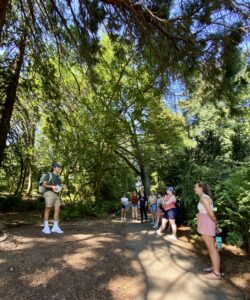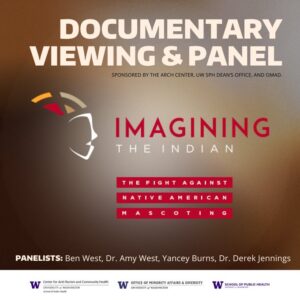The idea to replace Columbus Day with Indigenous Peoples’ Day was first proposed at the 1977 UN Conference by Indigenous advocates. Since then, more than a dozen states and hundreds of cities have adopted the day.
2014 marked the first Indigenous Peoples’ Day in the City of Seattle. The recognition was a result of advocacy by local Indigenous organizers since 2009. In 2021, President Biden officially recognized the second Monday in October as Indigenous Peoples’ Day.
The movement shifts the focus towards a more accurate representation of history, the resilience, and contributions of Native Americans spanning generations.
Today’s Moment
The University of Washington acknowledges the Coast Salish peoples of this land, the land which touches the shared water of all tribes and bands within the Suquamish, Tulalip, and Muckleshoot nations.
At EarthLab, we believe that centering equity and justice in environmental work includes honoring the knowledge and work of communities that disproportionately face environmental harms. This idea comes to bear when we consider the social and ecological harm Indigenous communities are experiencing due to large environmental events such as climate change, and we recognize the value and necessity of acknowledging multiple ways of knowing. The following are UW-related resources and events recognizing Indigenous Peoples’ Day.
Watch Together
Tonight (Monday, October 10th from 6:00-8:00pm)! Head to the Samuel E. Kelly Ethnic Cultural Center for a screening of ‘Imagining the Indian‘, a documentary that examines the movement that is ending the use of Native American names, logos, and mascots in the world of sports and beyond.
The event is put on by the UW Center for Anti-Racism and Community Health (ARCH), UW Office of Minority Affairs and Diversity (OMA&D), wǝɫǝbʔaltxʷ Intellectual House, and the UW School of Public Health.
Explore the Indigenous Speaker Series
EarthLab is proud to co-sponsor a virtual Indigenous Speaker Series hosted by the Northwest Indian College. The series amplifies voices of Indigenous people and promotes a dialogue about Indigenous people’s culture and traditional lived experiences.
A list of past conversations including recordings can be found here.
Walk the Walk
Experience the UW Seattle campus from a different perspective — through the Indigenous Walking Tour.

Created by recent graduate Owen L. Oliver (Quinault/Isleta Pueblo), the tour guides you through stories of place across seven locations on campus. You can pick up a copy of the walking tour booklet at the University Book Store, on the American Indian Studies website or experience the tour virtually.
Watch Gather
he EarthLab Learning Collective offered a free screening of Gather to our staff this summer. Gather is a documentary about Indigenous food sovereignty. The film beautifully captures efforts to rediscover identity through ancestral foods.
“The industrial revolution is over. Now, if we want to survive, if we want to carry on life on Earth, we need to be a part of the restorative revolution,” – Samuel Gensaw (Yurok), activist
Learn more about the film, the stories featured, and how to watch on the Gather Film website.
Be in Community
Explore these resources for UW students, faculty and staff:
- First Nations @ UW undergraduate intertribal registered student organization RSO
- UW Native Staff and Faculty Association
- UW Tri-Campus Resource List
- UW Combined Fund Drive
